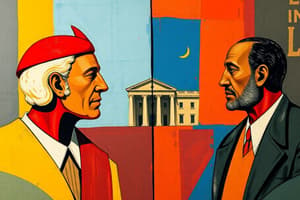Podcast
Questions and Answers
What are the two most common types of democracy mentioned in the text?
What are the two most common types of democracy mentioned in the text?
Representative Democracy and Direct Democracy
What principle of democracy states that the power of the state is derived from the consent of the people?
What principle of democracy states that the power of the state is derived from the consent of the people?
Sovereignty of the People
Which country operates with a Representative Democracy according to the text?
Which country operates with a Representative Democracy according to the text?
United States
What is the principle of democracy that ensures the government is bound by law, and no one is above the law?
What is the principle of democracy that ensures the government is bound by law, and no one is above the law?
Signup and view all the answers
What do citizens in a democratic system have the right to participate in, according to the text?
What do citizens in a democratic system have the right to participate in, according to the text?
Signup and view all the answers
What is the principle of democracy that ensures no individual or group becomes too powerful?
What is the principle of democracy that ensures no individual or group becomes too powerful?
Signup and view all the answers
What benefit does democracy provide by promoting individual rights and freedom of speech?
What benefit does democracy provide by promoting individual rights and freedom of speech?
Signup and view all the answers
Identify a challenge of democracy related to disenfranchisement of certain groups due to unequal power distribution.
Identify a challenge of democracy related to disenfranchisement of certain groups due to unequal power distribution.
Signup and view all the answers
In which ancient city-state can the origins of direct democracy be traced back to?
In which ancient city-state can the origins of direct democracy be traced back to?
Signup and view all the answers
What is a challenge of democracy that can be caused by low voter turnout and political indifference?
What is a challenge of democracy that can be caused by low voter turnout and political indifference?
Signup and view all the answers
Study Notes
Class 9 Social Science: Understanding Democracy
Democracy is a fundamental concept in the world of politics and governance. As students in Class 9, delving into this topic is not only enlightening but also crucial to understanding the principles that shape our societies. In this article, we'll explore the distinct types of democracy, the fundamental principles that guide it, the benefits that it brings, and the challenges it faces.
Types of Democracy
Democracy comes in various forms. The two most common types are:
- Representative Democracy: In this system, citizens elect representatives to act on their behalf in decision-making. The key actors are the elected officials and political parties.
- Direct Democracy: In this system, citizens actively participate in decision-making through referendums, initiatives, and plebiscites, either directly or through elected delegates.
For example, the United States operates with a Representative Democracy, while Switzerland employs a Direct Democracy model in some aspects.
Principles of Democracy
Democratic systems are built around specific principles, which include:
- Sovereignty of the People: The power of the state is derived from the consent of the people.
- Rule of Law: The government is bound by law, and no one is above the law.
- Free and Fair Elections: Citizens are entitled to vote in open, fair, and competitive elections.
- Equality: Citizens are entitled to equal representation in the political process.
- Checks and Balances: Power is divided among different branches of government, preventing any individual or group from becoming too powerful.
- Protection of Minorities: The rights of minority groups are protected, and their voices are heard in the political process.
Benefits of Democracy
Democracy offers several benefits that are crucial to the functioning of a society:
- Accountability: Democratic governments are answerable to the people, and citizens have the right to hold their representatives accountable for their actions.
- Freedom: Democracy promotes individual rights, freedom of speech, and freedom of association.
- Economic Growth: The rule of law and protection of property rights lead to a more stable and productive economy.
- Quality Government: Democratic systems are more likely to result in competent and effective government.
Challenges of Democracy
Despite being an attractive form of government, democracy has its challenges:
- Corruption: Democracy can be threatened by corruption, which undermines the rule of law and accountability.
- Inequality: The distribution of power and resources may be unequal, leading to disenfranchisement of certain groups.
- Polarization: Strong opinions and partisan divides can lead to political gridlock and polarization.
- Apathy: Low voter turnout and indifference to the political process can undermine the legitimacy of democratic institutions.
- Erosion of Civil Rights: Democratic institutions can be undermined by the erosion of civil rights and the suppression of individual freedoms.
History of Democracy
The history of democracy can be traced back to ancient Athens, where the city-state employed a form of direct democracy. The modern concept of representative democracy was developed during the 17th century in Europe. Throughout history, democracy has evolved, expanding to include women, people of color, and marginalized groups.
Yet, democracy is not a static concept. As societies change and evolve, democracy must adapt to meet new challenges. This constant evolution ensures that democracy continues to serve as a beacon of hope and freedom for people around the world.
Studying That Suits You
Use AI to generate personalized quizzes and flashcards to suit your learning preferences.
Description
Delve into the fundamental concepts of democracy, including its various types such as representative and direct democracy, key principles like sovereignty of the people and checks and balances, benefits like accountability and freedom, as well as challenges such as corruption and inequality. Explore how democracy has evolved throughout history and the importance of its constant adaptation in today's changing societies.




